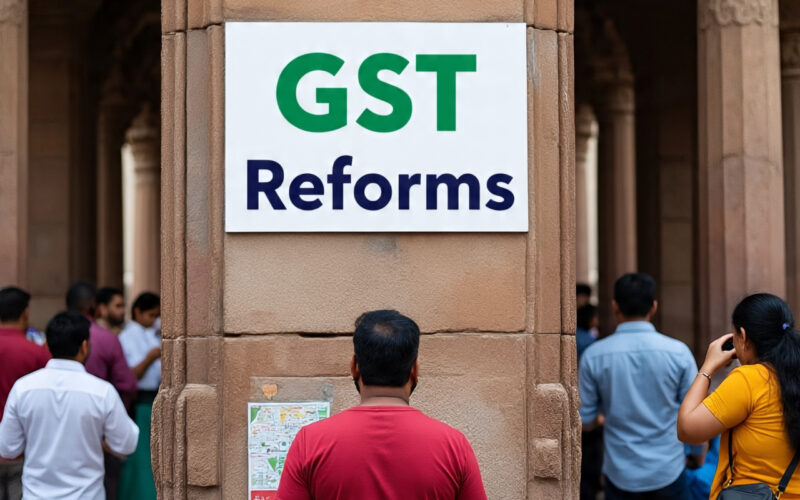#GST #GSTIndia #ConsumerRights #GSTComplaints #NationalConsumerHelpline #NCH #NextGenGST #TaxReforms2025 #ConsumerAwareness #GSTCouncil
By Staff Correspondent
New Delhi – In a move aimed at strengthening consumer empowerment and ensuring greater compliance under India’s indirect tax regime, the Department of Consumer Affairs has rolled out a dedicated grievance redressal facility for Goods and Services Tax (GST) issues on the National Consumer Helpline (NCH).
The facility gives consumers a direct platform to lodge complaints relating to revised GST rates, incorrect billing, denial of exemptions, or other GST-linked discrepancies. This initiative comes just days ahead of the rollout of the much-awaited Next-Gen GST Reforms 2025, scheduled to take effect from September 22, 2025, following approval at the 56th GST Council meeting chaired by Union Finance Minister Nirmala Sitharaman.

The new mechanism is also closely aligned with Prime Minister Narendra Modi’s Independence Day 2025 vision, which emphasized creating a consumer-centric GST ecosystem where citizens are not only tax contributors but also vigilant monitors of compliance.
How Consumers Can Register Complaints
Under the new system, complaints can be submitted via a dedicated GST category on the Integrated Grievance Redressal Mechanism (INGRAM) portal. To ensure granularity, multiple sub-categories have been introduced covering key sectors such as:
-
Automobiles
-
Banking and financial services
-
FMCG products
-
Consumer durables and electronics
-
E-commerce and digital marketplaces
Multi-Channel Access
In keeping with the government’s push for digital inclusion, complaints can be lodged through several convenient channels:
-
Toll-free number 1915
-
National Consumer Helpline app
-
Web portal
-
WhatsApp and SMS services
-
Email support
-
Umang app
The facility is available in 17 regional languages, including Hindi, English, Tamil, Bengali, Gujarati, Assamese, and others, ensuring accessibility for a diverse consumer base.
Every registered complaint will be assigned a unique docket number, enabling consumers to track the progress of their grievance in real time. Complaint data will be shared with concerned companies, the Central Board of Indirect Taxes and Customs (CBIC), and relevant regulators to facilitate faster resolutions.
Preparations Ahead of Rollout
The Department of Consumer Affairs, in collaboration with CBIC, conducted a special training session for NCH counsellors on September 11, 2025, equipping them to handle GST-related queries and complaints effectively.
Further, on September 17, 2025, the Department held consultations with leading e-commerce platforms, consumer durable manufacturers, and industry associations. Businesses were urged to ensure timely passing on of GST rate reductions to customers, particularly in sectors where new rates are set to apply from September 22.
Strengthening GST Compliance
The Department has stated that this new facility will serve as a feedback loop for the government, helping authorities track ground-level compliance.
“By capturing consumer complaints and sharing them with the concerned authorities, the NCH will play a pivotal role in ensuring that businesses pass on tax benefits to buyers,” the Ministry noted.
This mechanism is expected to reduce instances of overcharging, denial of exemptions, or misinformation related to revised GST rates. By empowering consumers to directly flag discrepancies, the government hopes to strengthen the culture of participatory governance in taxation.
National Consumer Helpline’s Expanding Role
The NCH has witnessed exponential growth over the past decade, establishing itself as a trusted hub for grievance redressal.
-
In 2025, the helpline is handling over 1.7 lakh complaints per month, compared to just 37,000 in 2017.
-
Call volumes have surged from 12,553 in December 2015 to 1.55 lakh in December 2024, reflecting growing consumer awareness and reliance on the platform.
-
With 1,142 convergence partners — including private companies, regulators, and ombudsman offices — the NCH has expanded its influence across multiple sectors.
-
Notably, nearly 65% of complaints are now registered digitally, marking a shift towards tech-driven grievance redressal.
Industry experts believe that the addition of GST grievance redressal will add significant value. Consumers can now flag cases of non-compliance in real time, ensuring that rate reductions announced by the GST Council are effectively implemented at the retail level.
Industry Reactions
Tax experts and industry stakeholders have welcomed the move as a critical step in safeguarding consumer interests while enhancing transparency in GST implementation.
According to analysts, this initiative can also act as a deterrent for businesses that might otherwise attempt to withhold tax benefits or overcharge customers. With an efficient mechanism in place, consumers will now have the confidence that their grievances will be addressed systematically.
Retail associations, meanwhile, have urged the government to ensure swift resolutions to maintain business confidence and avoid undue penalization of companies facing genuine system-related challenges during the initial transition phase.
Looking Ahead
The integration of GST grievance redressal into the National Consumer Helpline marks a paradigm shift in consumer protection under India’s indirect tax regime. By enabling a direct channel for consumer feedback, the government is not only empowering citizens but also creating an accountability system that can significantly improve compliance.
With Next-Gen GST Reforms 2025 around the corner, this facility comes at an opportune moment, reinforcing the government’s commitment to making the GST ecosystem more transparent, responsive, and consumer-friendly.
As India moves into the next phase of its GST journey, this development could set a precedent for embedding consumer participation more deeply into tax administration and governance.
Suggested Hashtags
#GST #GSTIndia #ConsumerRights #GSTComplaints #NationalConsumerHelpline #NCH #NextGenGST #TaxReforms2025 #ConsumerAwareness #GSTCouncil #EaseOfLiving #DigitalIndia #ConsumerProtection #ParticipatoryGovernance

